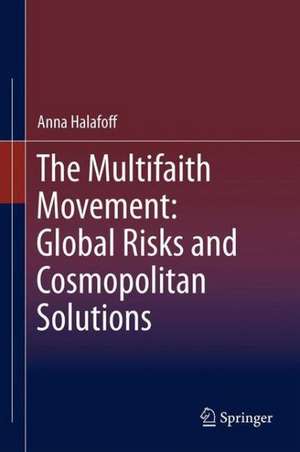The Multifaith Movement: Global Risks and Cosmopolitan Solutions
Autor Anna Halafoffen Limba Engleză Paperback – 9 noi 2014
Identifying the principle aims of the multifaith movement, the analysis explores the benefits—and challenges—of multifaith engagement, as well as the effectiveness of multifaith initiatives in countering the process of radicalization. Building on notions of cosmopolitanism, thework proposes a new theoretical framework termed ‘Netpeace’, which recognizes the interconnectedness of global problems and their solutions. In doing so, it acknowledges the capacity of multi-actor peacebuilding networks, including religious and state actors, to address the pressing dilemmas of our times. The primary intention of the book is to assist in the formation of new models of activism and governance, founded on a ‘politics of understanding’ modeled by the multifaith movement.
| Toate formatele și edițiile | Preț | Express |
|---|---|---|
| Paperback (1) | 635.65 lei 6-8 săpt. | |
| SPRINGER NETHERLANDS – 9 noi 2014 | 635.65 lei 6-8 săpt. | |
| Hardback (1) | 641.85 lei 6-8 săpt. | |
| SPRINGER NETHERLANDS – 30 oct 2012 | 641.85 lei 6-8 săpt. |
Preț: 635.65 lei
Preț vechi: 747.82 lei
-15% Nou
Puncte Express: 953
Preț estimativ în valută:
121.67€ • 132.21$ • 102.27£
121.67€ • 132.21$ • 102.27£
Carte tipărită la comandă
Livrare economică 21 aprilie-05 mai
Preluare comenzi: 021 569.72.76
Specificații
ISBN-13: 9789400796959
ISBN-10: 9400796951
Pagini: 200
Ilustrații: XVI, 184 p.
Dimensiuni: 155 x 235 x 11 mm
Greutate: 0.29 kg
Ediția:2013
Editura: SPRINGER NETHERLANDS
Colecția Springer
Locul publicării:Dordrecht, Netherlands
ISBN-10: 9400796951
Pagini: 200
Ilustrații: XVI, 184 p.
Dimensiuni: 155 x 235 x 11 mm
Greutate: 0.29 kg
Ediția:2013
Editura: SPRINGER NETHERLANDS
Colecția Springer
Locul publicării:Dordrecht, Netherlands
Public țintă
ResearchCuprins
Introduction: The Multifaith Movement and Common Security.- Theorising the Multifaith Movement.- The Rise of the Multifaith Movement in Ultramodernity.- The Clash between Cosmopolitans and Anti-Cosmopolitans.- 21st Century Multifaith Initiatives.- Benefits and Challenges of Multifaith Engagement.- Expanding Cognitive Frames: From Exclusivity to Pluralism.- Conclusion: Netpeace and the Politics of Understanding.
Recenzii
“In this important book Anna Halafoff both maps out the history of what she terms the multifaith movement as well as looks at where it is today and where it may be headed. … Halafoff’s book is a welcome and significant contribution to such areas as Interreligious Studies, the sociology of religion, and religion and politics. … I fully recommend this book to anyone looking at any of the issues discussed.” (Paul Hedges, Journal for the Academic Study of Religion, Vol. 29 (1), 2016)
Notă biografică
Dr. Anna Halafoff is a lecturer at the School of Political and Social Inquiry, Monash University in Sociology, the Master of Counter Terrorism Studies and the Master of Islamic Studies programs. She is also a researcher for the UNESCO Chair in Interreligious and Intercultural Relations – Asia Pacific at Monash. Anna was recognised as a United Nations Alliance of Civilisations Global Expert in the fields of multifaith relations and religion and peacebuilding in 2011.
Textul de pe ultima copertă
This book documents the ultramodern rise of the multifaith movement, as mulitfaith initiatives have been increasingly deployed as cosmopolitan solutions to counter global risks such as terrorism and climate change at the turn of the 21st century. These projects aim to enhance common security, particularly in Western societies following the events of September 11, 2001 and the July 2005 London bombings, where multifaith engagement has been promoted as a strategy to counter violent extremism. The author draws on interviews with 56 leading figures in the field of multifaith relations, including Paul Knitter, Eboo Patel, Marcus Braybrooke, Katherine Marshall, John Voll and Krista Tippett.
Identifying the principle aims of the multifaith movement, the analysis explores the benefits—and challenges—of multifaith engagement, as well as the effectiveness of multifaith initiatives in countering the process of radicalization. Building on notions of cosmopolitanism, the work proposes a new theoretical framework termed ‘Netpeace’, which recognizes the interconnectedness of global problems and their solutions. In doing so, it acknowledges the capacity of multi-actor peacebuilding networks, including religious and state actors, to address the pressing dilemmas of our times. The primary intention of the book is to assist in the formation of new models of activism and governance, founded on a ‘politics of understanding’ modeled by the multifaith movement.
Identifying the principle aims of the multifaith movement, the analysis explores the benefits—and challenges—of multifaith engagement, as well as the effectiveness of multifaith initiatives in countering the process of radicalization. Building on notions of cosmopolitanism, the work proposes a new theoretical framework termed ‘Netpeace’, which recognizes the interconnectedness of global problems and their solutions. In doing so, it acknowledges the capacity of multi-actor peacebuilding networks, including religious and state actors, to address the pressing dilemmas of our times. The primary intention of the book is to assist in the formation of new models of activism and governance, founded on a ‘politics of understanding’ modeled by the multifaith movement.
Caracteristici
First in-depth sociological study investigating the multifaith movement, contributing new evidence to challenge the secularisation theory First book clearly explaining the role that multifaith initiatives play in countering terrorism New theoretical Netpeace framework, providing a missing narrative within the sociology of religion literature








